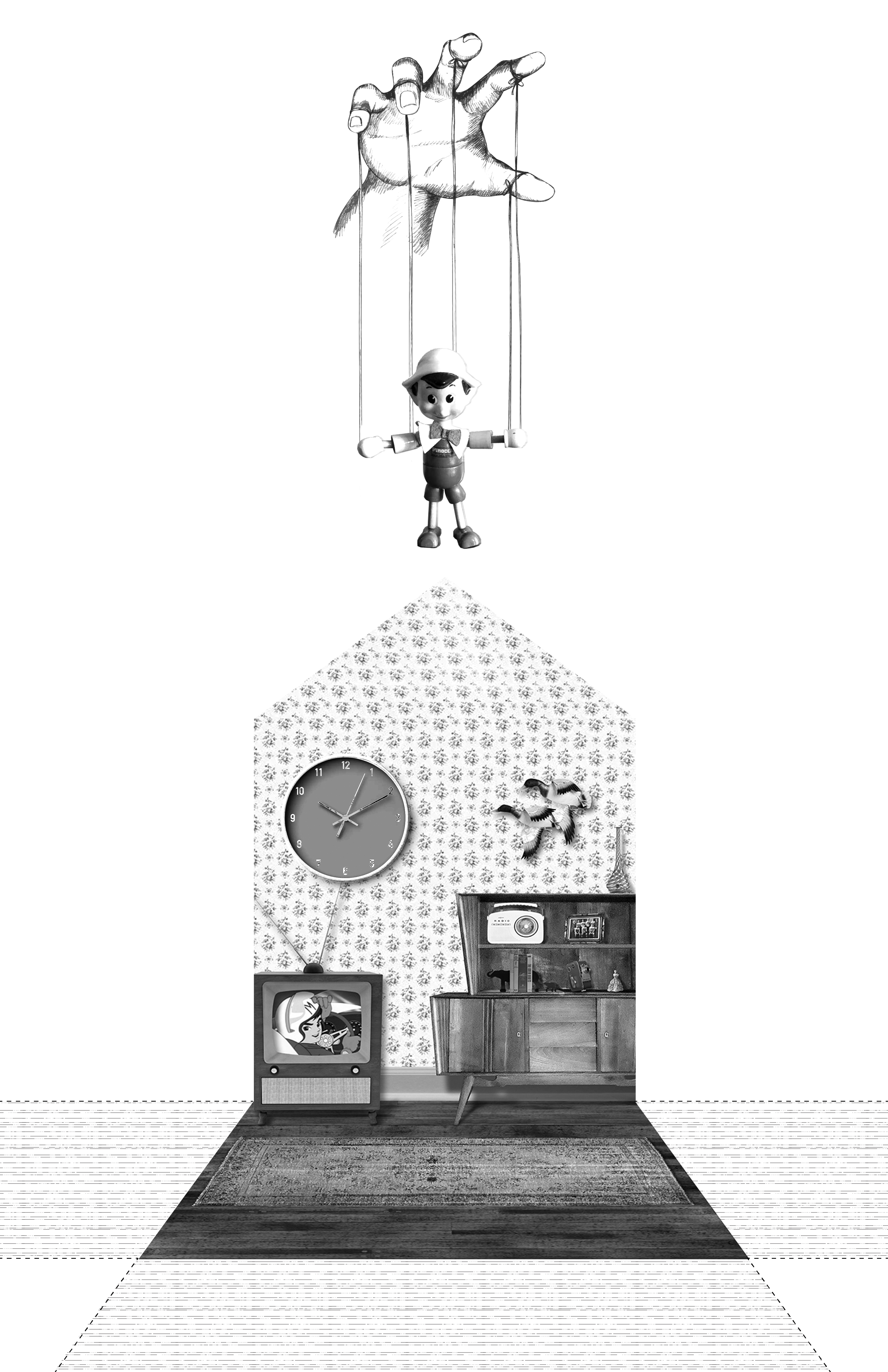Paper House - The Rooms of Déjà Vu
Contributor
-ish
There are countless scientific theories as to why more than two-thirds of humans experience this déjà vu , and while there is no definitive answer, the effects of this sensation leave the mind unresolved yet intrigued. Déjà vu is French for “seen before” and has become a universal phrase for a puzzling phenomena that inherently is individualized and forces us to introspect into our mind and memories. During these moments of déjà vu, we find ourselves in a state of limbo between two worlds, one detailing a premonition of the event that’s unfolding, and the other consciously recognizing the snapshots of the moments as familiar. Inherently, déjà vu places us as the audience in a cerebral theater, in which we observe a puppet on the stage that resembles ourselves acting out the actions, words, and emotions as the story unfolds. Through the eyes of the puppet, within its fabricated theatrical paper house, we witness its encounter with such moments of déjà vu and begin to piece together the reasons for this sensation. Through the progression within the paper house, we ask ourselves, have we experienced that same room or that same feeling before—and perhaps unconsciously, we have.
There is the possibility that as we dream, our animated self-identified puppet wanders and has its own encounter with the universe, entering into parallel realms. As the dreams are quickly forgotten upon awakening in the current physical state, they are simply filed away into the temporal lobe of our brains. Although repressed, hidden, and seemingly forgotten, those out of body dreams experienced through the puppet could be one reason we encounter those moments of déjà vu in our physical world. Perhaps, as one senses this, we are recalling those forgotten dreams. Is the sensation of déjà vu merely the consciousness’ attempt of recognizing a discarded memory as familiar? If so, then our own habits, interactions, and thoughts are manifested through our dreams, influencing the puppet’s pseudo-physical interactions within the hallways of such a cerebral paper house. If we make changes to our lives, riddled with unfamiliarity, then the paper house is forced to create new rooms, rearrange the items, and stretch the hallways. Thus, as the puppet wakes up, gets out of bed, and heads to the living room, the habitual routine can be disrupted through triggers deemed foreign. Conveniently enough, a misplaced object, a picture frame tilted upside down, or the television tuned to a channel never tuned to before can become those triggers.
Furthermore, as the puppet wanders from room to room, observing the walls that enclose it, the items it touches, and the light that shines through the windows, it encounters a past life staring right back. The rooms become moving backdrops to the puppet and as it passes through, so do those eerie and familiar thoughts and artifacts. However, as the strings are pulled and directed, new moments appear, creating an array of new memories to recall upon. Thus, although the puppet enters the same room over and over again, the deviations are the crucial aspect of study. If the puppets are manifestations of ourselves in our dreams, then the eerie spaces we venture into are the paper houses, filled with our intrinsic collections of items and memories, only to be replayed in a constant loop. As the puppet wanders through its paper house, it is forced to ask, “Am I dreaming? Why does all of this feel so familiar?”
The journey of the puppet is one of discovery through its interactions within the paper house, and one of self-awareness through its conscious recognition of memories, dreams and autonomy. The puppet questions its reality, debating the difference between destiny and programmation. There must be a reason as to why the puppet continues to encounter déjà vu. Perhaps there is no closure, just as no memory we have is perfect, neither would there be any possible answers.
We could interpret the sensation of déjà vu within the paper house as the conscious mind making links between rooms, stored memories and individual items we hold in certain discreet places. In the same fashion we hold treasures in boxes under our beds, so could the unconscious mind operate with memories we categorize as familiar and foreign. No memory is too far gone, and déjà vu could represent an instance of replay from past moments or past lives’ energy manifested into the present life of the puppet. Could the puppets’ conscious mind have lived a million lives in its journey, living simultaneously in each room in the paper house through its embodied memories in homes’ walls and items? The familiarity of déjà vu shouldn’t feel so distanced and quickly discarded. Embrace the sensation as a close connection to our inhabited spaces and experiences. Piecing together the sensations, one discovers that the only way to describe what déjà vu truly means to us is to experience it, over and over again.

A Puppet’s Encounter with Déjà Vu Moments